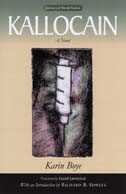Kallocain
Karin Boye
Translated by Gustaf Lannestock;
Introduction by Richard B. Vowles
Library of World Fiction
This classic Swedish novel envisioned a future of drab terror. Seen through the eyes of idealistic scientist Leo Kall, Kallocain's depiction of a totalitarian world state is a montage of what novelist Karin Boye had seen or sensed in 1930s Russia and Germany. Its central idea grew from the rumors of truth drugs that ensured the subservience of every citizen to the state.
"A fascinating novel of the 1984 and Brave New World genre."—Library Journal
"Despite the robot-like characteristics of the fellow-soldiers in Boye's nightmare city, she expresses her poetic genius in the use of symbols and imagery."—Signe A. Rooth, Scandinavian Studies
Karin Boye (1900–1941) was a Swedish poet and novelist whose suicide in 1941 amid the shambles of a war-racked Europe reflects the fate of a whole generation of writers. Her first novel, Astarte, appeared in 1931.
Media & bookseller inquiries regarding review copies, events, and interviews can be directed to the publicity department at publicity@uwpress.wisc.edu or (608) 263-0734. (If you want to examine a book for possible course use, please see our Course Books page. If you want to examine a book for possible rights licensing, please see Rights & Permissions.) |
|

April 2002
220 pp. 6 x 9
|
